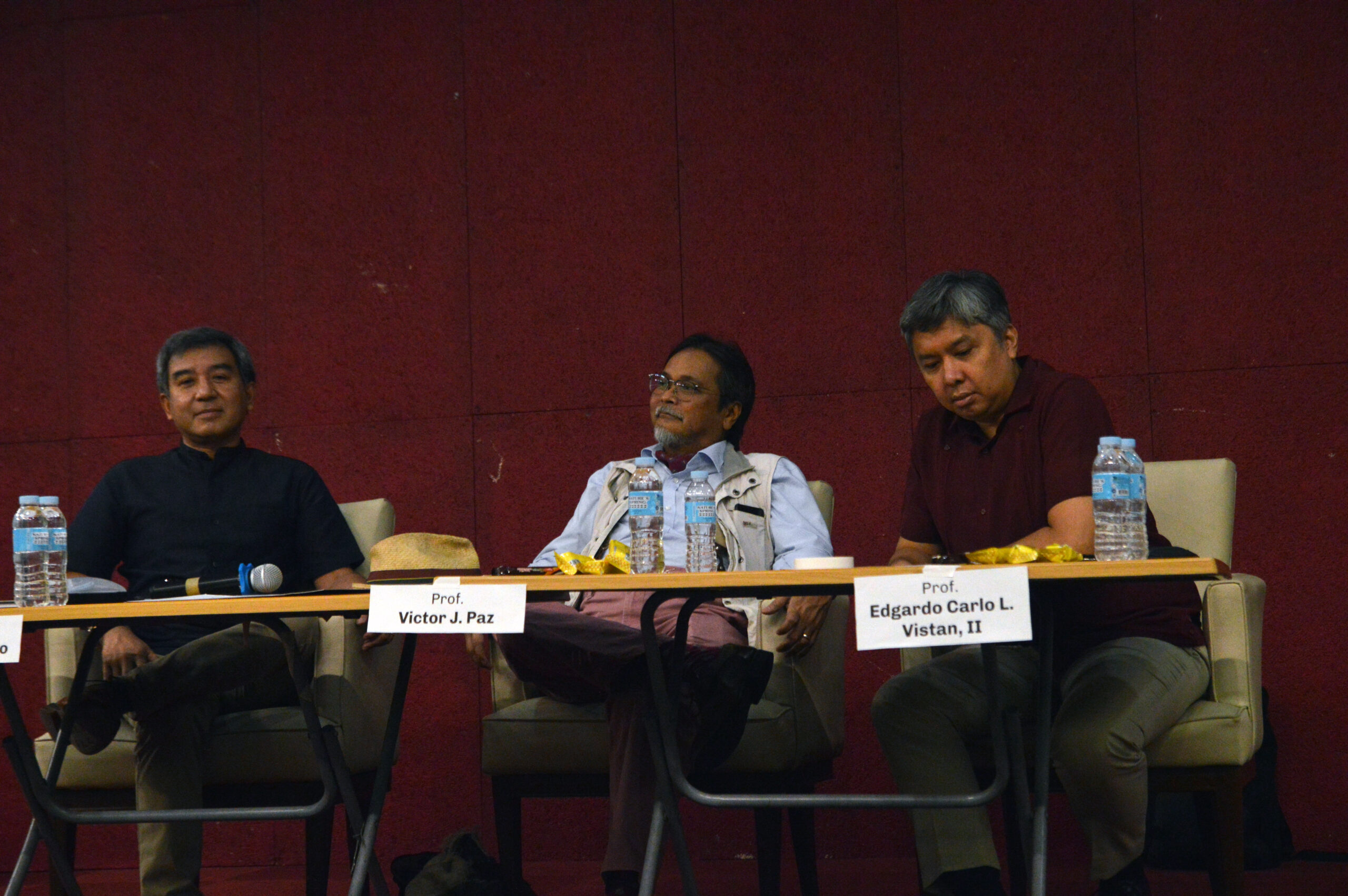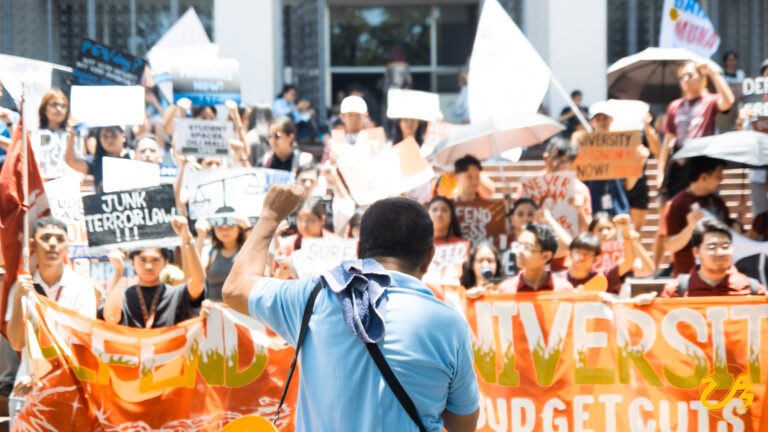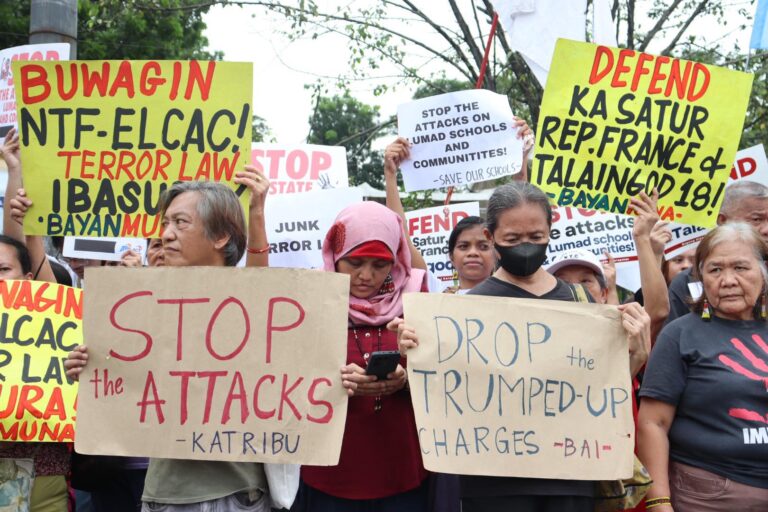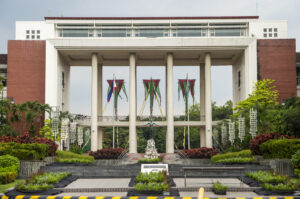
While all three candidates agree on many points of unity, they also disagree on several key issues. As we point out the differences between their answers and statements over the past weeks, we ask: what sets each of them apart, and who represents the community’s interests best?
General Vision
All three nominees articulated very different visions of the university under their term if selected chancellor.
For Nemenzo, UP must become an “inclusive, smart, sustainable, and public-service oriented” university. Highlighting the need to keep a tight grip on UP’s resilience, excellence, and principles, Nemenzo says that UP must maximize the community’s potential to fulfill its mandate as the “University of the People.”
Paz’s vision revolves around the concept of the “University Town,” a placemaking field where everyone in the community – students, teachers, staff, local residents, and everyone else in the campus – has a sense of belonging.
Vistan’s operational word is engagement. By activating all sectors, Vistans says, and keeping the “meaningfully and actively engaged,” the Office of the Chancellor can take a direction built on the collective needs of the community.�
General Education Classes
Although all three candidates say that General Education classes are central to the curriculum, there are slight nuances to why exactly this is the case.
For Paz, GE courses are important because they are the core of the university model, saying that the university is “only as good as the foundations of its liberal education. He also says that it will help address growing concerns over Artificial Intelligence.
Vistan, on the other hand, says that GE courses are essential, just like any other subject out of one’s field of specialization: as wells to draw from and apply to one’s own line of work. “Ako, as a specialist in law, I can tell you I’ve picked up many things in areas outside of life,” he said. But, setting side utility, he says that these courses are times to “relax and enjoy,”
Nemenzo agrees with Paz, saying that GE courses will help students deal with impending social issues like AI. But more than with just the technology, he says, GE courses give students the viewpoint with which to approach social issues. Moreover, he says that this viewpoint also ensures that students use their own fields not just as technicians, but as conscious contributors to society.
Academic Freedom
There are important differences between how the candidates understand academic freedom.
Vistan, who served on one of the committees studying different bills pushing for the institutionalization of the UP-DND Accord, says that the university must have a clear stance on academic freedom. He says that the campus must be a safe space, free from red-tagging.
Nemenzo, a long-time proponent of academic freedom himself, says that academic freedom is the “lifeblood of the university.” Recalling his stint as chancellor – when he actively opposed a red-tagging rally on campus and relentlessly lobbied against campus militarization – Nemenzo vowed to ensure that the campus is a “haven for civilized and intelligent discourse.”
Paz views academic freedom as essentially a free market of ideas where, regardless of the idea’s content, the university has absolutely no control. When asked about what he would do if known red-taggers like the Hands Off Our Children Movement and the Duterte Youth held a rally in the campus, he encouraged progressives to instead stage a rally of their own, because “the better idea will win out.” In another answer, however, he did say that red-taggers must be held accountable.
Lack of Academic Units
The three nominees offer a variety of solutions for the shortage in available academic units.
Nemenzo says that the answer lies in the numbers. As seen in several of his other answers, Nemenzo says that by analyzing the data behind enrollment and registration trends, the university will be able to respond to students’ needs. He also says that we should consider expanding not just the number of classes but the number of students per class.
Paz says that this problem is mainly a problem for GE classes, so the administration must start there. He says that the administration should just ask these offering units to open more classes, especially for the most in-demand courses. He also says that the university must bring back teachers’ prerogatives.�
Disagreeing with Nemenzo, Vistan says that it is more important to know the immediate course demands. He suggests a survey asking students the exact courses they plan to take next semester – a system being implemented in some departments, including the College of Law. This, he says, will let departments know how to allocate their professors. If the problem is classrooms, Vistan says that the university can go back to offering some courses completely online. He also suggests adding more part-time instructors.
Contractualization
Although during the fast talk round of the Kilatis: Student Forum all three nominees answered that they were against contractualization, they expounded on this in different ways.
Paz and Nemenzo are largely in agreement: in the long-term, the university should be moving away from contractualization. “It is bad from employees, it is bad for the university,” Nemenzo said. Paz suggests that, in the short-term, we should at least hire more UP-contractuals than non-UP contractuals, but says that in the long-term, the only answer is to find more permanent items.
Vistan, on the other hand, says that contractualization is not inherently bad. For some employees, he says, the part-time arrangement is preferable. He also says that in many instances, UP hires employees contractually because the available permanent items are for lower positions, and it is even more lucrative for employees to become contractual. The important thing, Vistan says, is to go beyond legal terminologies and to treat them like regular employees.
Budget Priorities
If chosen as chancellor, the three nominees have different budgeting priorities too.
For Vistan, the most important priority is to respond to infrastructure backlogs, saying that the funds spent on them by the previous administrations would go to waste. Meanwhile, the remaining budget should go to improving the university’ digital infrastructure.
Paz agrees with the initiative to develop the university’s digital infrastructure. He adds that finding more permanent items for employees should also be a priority.
Nemenzo, in contrast, wants to focus on welfare and benefits for constituents. He says that he would focus on providing serivces such as psychosocial support, improving Diliman’s health facilities, and providing more benefits for employees.
Admission Process
While Paz and Vistan lauded the return of the UPCAT, Nemenzo has been consistent in saying that it should not be the biggest determinant of admission.
Both Paz and Vistan have said that the UPCAT is a “great equalizer,” noting that often, high school grades are not measured equally between institutions, and that they trust the University’s testing capabilities. Vistan added, however, that he wanted to explore the possibility of adding other factors such as extracurricular activities.
Nemenzo, however, disagrees. He says that far from testing actual academic potential, the data shows that the UPCAT is a poor predictor of performance in UP. He says that testing conditions on the data itself and many other factors hamper its ability to effectively screen students.
Reasons for running
All three nominees also pointed to very different reasons for running.
Nemenzo said that he was running because, as someone who grew up in the campus and has spent almost his entire academic career in Diliman, he understands “what the university needs and represents,” and his previous three years was not enough.
Paz, on the other hand, attributes his bid for the chancellorship to his “many pet peeves” amassed throughout the years. He says that he saw the chancellorship as an opportunity to solve the problems he has seen with the university in his long stay.
Lastly, Vistan believes that he has imbibed the culture of engagement that he wanted for the College of Law, saying that another term would be “more of the same.” He thinks that it is time to build this culture on the university level.
Quotes are from the UPAdministration’s Public Forum, KILATIS: Student Forum, Tapatan sa Diliman 2023, and the Philippine Collegian’s interview with the nominees.








I and my pals have been going through the excellent tips and hints from your web site while immediately I had an awful feeling I never thanked the website owner for those tips. All of the people ended up as a consequence excited to see them and have in effect certainly been using those things. Thanks for indeed being really thoughtful and then for utilizing this sort of remarkable ideas millions of individuals are really desperate to learn about. My very own sincere regret for not expressing gratitude to earlier.